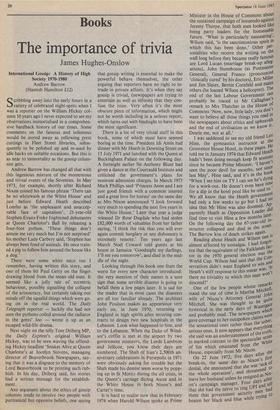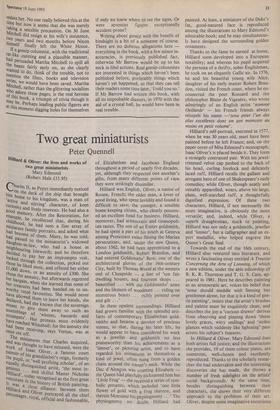Books
The importance of trivia
James Hughes-Onslow
International Gossip: A History of High Society 1970-1980 Andrew Barrow (Hamish Hamilton £12)
Scribbling away into the early hours in a variety of celebrated night-spots when I was a reporter on the William Hickey col- umn 10 years ago I never expected to see my observations immortalised in a comprehen- sive hardback history of our times. Some comments on the famous and infamous would be stored away as yellowing press cuttings in Fleet Street libraries, subse- quently to be polished up and re-used by idle hacks on suitable occasions. But this is as near to immortality as the gossip colum- nist gets.
Andrew Barrow has changed all that with this ingenious mixture of the momentous and trivial events of the Seventies. In May 1973, for example, shortly after Richard Nixon coined his famous phrase 'There can be no whitewash at the White House' and just before Edward Heath described Lonrho as 'the unpleasant and unaccep- table face of capitalism', 21-year-old Stephen Evans-Freke frightened debutantes at Queen Charlotte's Ball by releasing a four-foot python. 'These things don't amuse me very much but I'm not surprised' his mother Lady Carbery said, 'Stephen has always been fond of animals. He once train- ed a pig to follow him around the house like a dog.'
There were some white mice too I remember, having written this story, and one of them bit Paul Getty on the finger drawing blood from the mean old man. It seemed like a jolly tale of eccentric behaviour, possibly signalling the collapse of the aristocracy, but certainly taking our minds off the squalid things which were go- ing on in the real world. The Daily Telegraph reporter — luckily she had not seen the pythons coiled around the radiator in the gents' loo — wrote it up as an escaped wild-life drama.
Next night on the telly Tom Driberg MP, the Daily Express's original William Hickey, was to be seen waving the offend- ing Hickey headline `Snakes Alive at Queen Charlotte's at Jocelyn Stevens, managing director of Beaverbrook Newspapers, say- ing that it was a disgrace to the memory of Lord Beaverbrook to be printing such rub- bish. In his day, Driberg said, his stories had a serious message for the establish- ment.
Any argument about the ethics of gossip columns tends to involve two people with puritanical but opposite beliefs, one saying that gossip writing is essential to make the powerful behave themselves, the other arguing that reporters have no right to in- trude in private affairs. It's when they say gossip is trivial, (newspapers are trying to entertain as well as inform) that they con- fuse the issue. Very often it's the most obscure piece of information, which might not be worth including in a serious report, which turns out with hindsight to have been the most significant.
There is a lot of very trivial stuff in this book, some of which must have seemed boring at the time. President Idi Amin had dinner with Mr Heath in Downing Street on 13 July 1971 and lunched with the Queen at Buckingham Palace on the following day. A fortnight earlier Sir Anthony Blunt had given a dance at the Courtauld Institute and criticised the government's plans for museum admission charges. In March 1973 Mark Phillips said 'Princess Anne and I are just good friends with a common interest and a great love for horses' on the same day as Mrs Nixon announced `I look forward very much to spending the next five years in the White House.' Later that year a judge released Dr Rose Dugdale who had stolen £82,000 worth of valuables from her father saying, 'I think the risk that you will ever again commit burglary or any dishonesty is extremely remote.' Ten years ago last March Noel Coward told guests at his house in Jamaica 'Goodnight my darlings, I'll see you tomorrow', and died in the mid- dle of the night.
Looking through this book one fears the worst for every new character introduced: the very mention of their names is a sure sign that some terrible disaster is going to befall them a few pages later. It is sad for the reader that in most cases the disasters are all too familiar already. The architect John Poulson makes an appearance very early on, in June 1970, returning to England in high spirits after securing con- tracts to design two new hospitals in the Lebanon. Look what happened to him, and to the Lebanon. When the Duke of Wind- sor's coffin is met at the airport by two government ministers, the Lords Lambton and Jellicoe, you know their days are numbered. The Shah of Iran's 2,500th an- niversary celebrations in Persepolis in 1971 were obviously asking for trouble but the Shah made his demise seem worse by popp- ing up in St Moritz during the oil crisis, in the Queen's carriage during Ascot and in the White House in both Nixon's and Carter's time.
It is hard to realise now that in February 1976 when Harold Wilson spoke as Prime Minister in the House of Commons about the sustained campaign of innuendo against Jeremy Thorpe, that both men looked like being party leaders for the foreseeable
future. 'What is particularly nauseating', Wilson said, 'is the sanctimonious spirit in which this has been done.' Other per- sonalities who receive the writing on the wall long before they became really famous are Lord Lucan (marriage break-up alleg- ations), John Stonehouse (as Postmaster General), General Franco (pronounced `clinically cured' by his doctors), Eric Miller and Jim Slater, Bernie Cornfeld and many others (he loaned Wilson a helicopter). The end of the last Labour Government can probably be traced to Mr Callaghan's remark to Mrs Thatcher in the House of Commons 'Now, now, little lady, you don't want to believe all those things you read in the newspapers about critics and upheavals and the end of civilisation as we know it. Dearie me, not at all.'
I was saddened to see my old friend Len
Hine, the gymnastics instructor at the Grosvenor House Hotel, in these pages. He told me in January 1974 that Edward Heath hadn't been doing enough keep fit sessions since he became Prime Minister. haven't seen the poor devil for months, not since last May', Hine said, and it's in the book 'When I see him on TV I can see he's dying for a work-out. He doesn't even have tirne, for a dip in the hotel pool like he used to. We all know that the Heath government had only a few weeks to go but I had no idea that Mr Hine was also doomed. Ap" parently Heath as Opposition Leader did find time to visit Hine a few months later. On the following day the 67-year-old in- structor collapsed and died in the street. The Barrow kiss of death strikes again. .
Reading about Heath and Wilson one Is
almost affected by nostalgia. I had forgot- ten that the equivalent of the Falklands fac- tor in the 1970 general election was the World Cup. Wilson had said that the and servatives didn't want England to win is Heath's stiff response to this smear was, there no triviality to which this man won descend?'
One of the few people whose remaks
stand the test of time is Martha Mitchell wife of Nixon's Attorney General J011.! Mitchell. She was thought to be llIt` hysterical in the early days of watergat,! and probably mad. The newspapers whIcli_ gave coverage to her outspoken claims were the sensational ones rather than the soh.er,: serious ones. It now appears that everYhlt,I6, she said was an understatement of the series _ in marked contrast to the spectacular of lies which emanated from the Whit' House, especially from Mr Nixon. Pt the
On 22 June 1972, five days s_
break-in, the same day as Nixon,'ssickfirto_it, denial, she announced that she was the whole operation', and threatened ,x°. leave her husband unless he resigned asaNftler on's campaign manager. Four days that she had the nerve to ring UPI andhtaedli them that government security men
to beaten her black and blue while trying sedate her. No one really believed this at the time but now it seems that she was merely taking a sensible precaution. On 30 June Mitchell did resign at his wife's insistence, two years and two months before Nixon himself finally left the White House. If a gossip columnist, with the traditional rat-like cunning and a plausible manner, had persuaded Martha Mitchell to spill all the beans fairly early on, as she clearly wanted to do, think of the trouble, not to mention the films, books and television series, we would have been saved. Martha Mitchell, rather than the glittering socialites who adorn these pages, is the real heroine of this book, a triumph of trivia though it may be. Perhaps leading public figures are at this moment digging holes for themselves if only we knew where to see the signs. Or were seventies figures exceptionally accident-prone?
Writing about gossip with the benefit of hindsight is a bit of a nonsense of course. There are no dubious allegations here everything in the book, with a few minor in- accuracies, is previously published fact, otherwise Mr Barrow would be up to his neck in libel actions. Real gossip columnists are interested in things which haven't been published before, preferably things which haven't yet happened, so that they can tell their readers some time later, 'I told you so.' If Mr Barrow had written this book, with all its improbable diasters, in 1970 with the aid of a crystal ball, he would have been in real trouble.







































 Previous page
Previous page